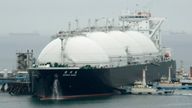Energy boss dismisses calls for windfall tax as he defends rise in profits
The chief executive of SSE has defended the energy company’s 23% rise in annual profits, which were bolstered by higher energy prices.
SSE’s chief executive, Alistair Phillips-Davies, dismissed calls for a windfall tax on the profits of energy companies, pointing to the company’s plans to invest £24bn in British energy infrastructure during this decade, including in new wind and hydroelectric power projects.
“We’re investing more money than we’re making in terms of profits,” he told Sky News.
UK ‘heading into unprecedented territory’ as energy price cap to rise – cost of living latest
“And we’re substantially increasing our investments – they were £2bn for the year just gone.
“And we’re looking at £2.5bn in the year that we’re in now, basically to next March. That’s the important thing.”
Asked if the plans would be blown off course by a windfall tax, he said: “What we’ve announced today has all been created by very clear and consistent government policy.
“What we want to see going forward is that clear, consistent policy maintained.”
He suggested a windfall tax was unnecessary, saying: “The government’s been incredibly successful to date in terms of policies that they’ve put in place.”
He said its earnings per share were “in line with internal targets”.
In its preliminary results, the FTSE 100 group said it expected profits to be even bigger this year and upgraded its earnings outlook for the next four years.
The company cited “higher and more volatile energy commodity prices” that benefited its gas-fired power plants.
SSE’s pre-tax profit came in at £1.16bn for the year to March, compared with £948.9m the year before.
The company also operates energy networks, wind farms and hydroelectric power plants.
:: Listen and subscribe to The Ian King Business Podcast here.
SSE increased its annual dividend to shareholders by 5.8%, while its adjusted earnings per share went up by 22% to 95.4p. This is expected to grow by an extra 26% to at least 120p this year.
Energy companies are reaping the benefits of sky-high prices, in part because demand has increased as the world emerges from the pandemic and due to supply constraints following sanctions imposed on Russia after its invasion of Ukraine.



